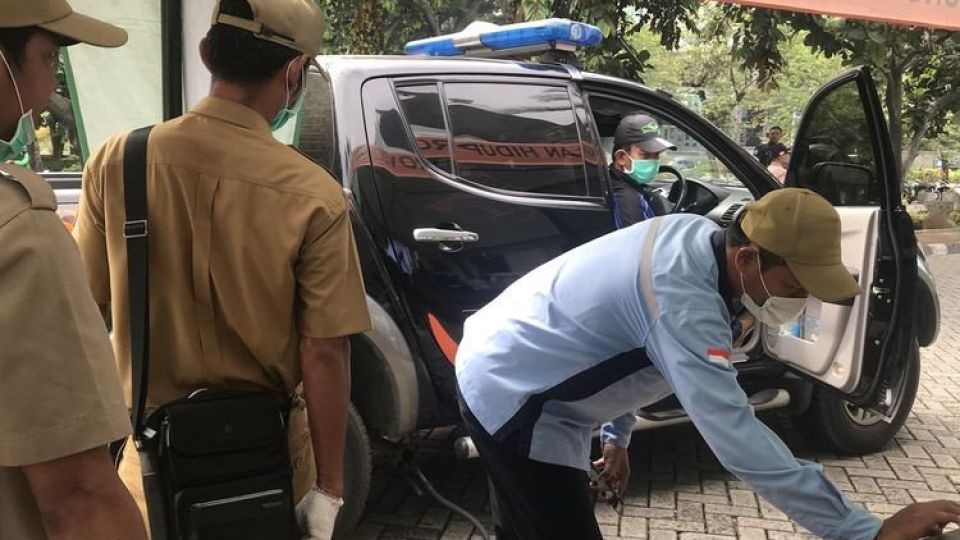August 11, 2023
JAKARTA – The Jakarta administration is working with the central government and its satellite cities to expand the number of emissions test locations sites in a combined effort to tackle the city’s worsening air pollution.
New emissions test locations are to be established in Bogor, Bekasi and Depok in West Java and in Tangerang, Banten, as the Jakarta administration looks to enforcing stricter emission controls for each vehicle traveling to and in the city.
Motorized vehicles, both public and private, are often highlighted as among the causes of the heavy pollution blanketing Jakarta.
A 2019 research by the Jakarta Environment Agency and global public health organization Vital Strategies found that vehicular emissions were the largest source of pollution in the city, contributing 32 to 41 percent to air pollution during the wet season and 42 to 57 percent during the dry season.
Some 3 million commuters travel daily to Jakarta from its satellite cities, according to the Jakarta Police, with most using private vehicles.
The Jakarta Environment Agency is also working with the Environment and Forestry Ministry to train around 400 mechanics from the satellite cities in conducting the emissions tests.
Agency head Asep Kuswanto said the training program would run from August to November. “Air pollution doesn’t care about administrative borders, so the role of satellite cities is crucial,” Asep said in a statement on Tuesday.
Since 2020, the Jakarta administration has been requiring owners of motor vehicles more than 3 years old to test them annually for the emissions they produce. Owners must take steps to lower the emissions their vehicles produce if the test results are high.
Authorities in the satellite cities have yet to issue a similar regulation on vehicular emissions, even though every vehicle traveling to, in or through Jakarta is subject to the city’s mandatory emissions testing rule.
The environment ministry’s air pollution control director Luckmi Purwandari said the ministry planned to apply the rule on mandatory emissions tests nationwide.
“In future, we’ll make the emissions test results a requirement for paying vehicle tax,” she added.
Stricter enforcement
Even though the regulation mandates emissions tests for vehicles over 3 years old, only a small proportion of such vehicles have complied.
Only around 900,000 of the 3.7 million cars in Jakarta, or 24 percent, have been tested for emissions, according to the Jakarta administration. The figure is even lower for motorcycles: a mere 72,800 out of 17.3 million, or 0.42 percent.
Experts have previously pointed to lackluster imposition of punishment as the leading cause of noncompliance among vehicle owners.
The 2020 gubernatorial regulation includes various sanctions ranging from tickets to higher parking fees for vehicles that fail to pass or take the emissions test. Its enforcement was initially planned for 2021, but hit a snag due to several factors including the COVID-19 pandemic and an insufficient number of testing locations.
Only 340 car repair shops and 108 motorcycle workshops in the city currently have emissions testing facilities, according to official data.
In February, Jakarta imposed higher rates at 11 high-volume public and private parking lots for cars that had not taken the emissions test, which led to a surge of 345,000 tested cars in six months.
Officials are now planning to expand the policy to the city’s other off-street parking facilities across the city, totaling more than 1,300 private and 79 public parking lots.
Asep of the Jakarta Environment Agency said earlier this month that the city also planned to ticket vehicle owners that had not complied with the emissions testing rule for fines ranging between Rp 250,000 (US$16.46) and Rp 500,000. This policy would be enacted in the next month or two.
Growing problem
The city’s chronic pollution issue is worsening now that the dry season has arrived, and Jakarta has consistently topped the list of the world’s most polluted major cities in recent weeks.
For the fourth day in a row on Thursday, Jakarta was the most polluted city in the IQAir rankings with an air quality index (AQI) of 161, which falls within the Swiss air quality technology company’s “unhealthy” range.
The city’s reading for PM 2.5 pollutants on the same day reached 74 micrograms per cubic meter (µg/m3), nearly 15 times more than the 5 µg/m3 that is considered safe by the World Health Organization (WHO).
PM 2.5 refers to fine, airborne pollutants produced by combustion from vehicles or power plants and other sources, and can be inhaled to cause respiratory diseases.
The pollution issue seems to be growing in line with the number of vehicles on its streets, with Acting Jakarta Governor Heru Budi Hartono saying recently that the number of motor vehicles had increased by 4 million in the last year and a half.
Stricter enforcement of vehicle emissions testing was the right step toward controlling the city’s pollution, said Suci Fitria Tanjung, the Jakarta branch director of the Indonesian Forum for the Environment (Walhi).
“But officials should ensure that the city has enough testing facilities, especially when they start fining people who do not comply with the regulations,” Suci said.
She added that Jakarta also needed to control pollution from other sources, such as industries, coal-fired power plants and the widespread practice of burning household waste.


